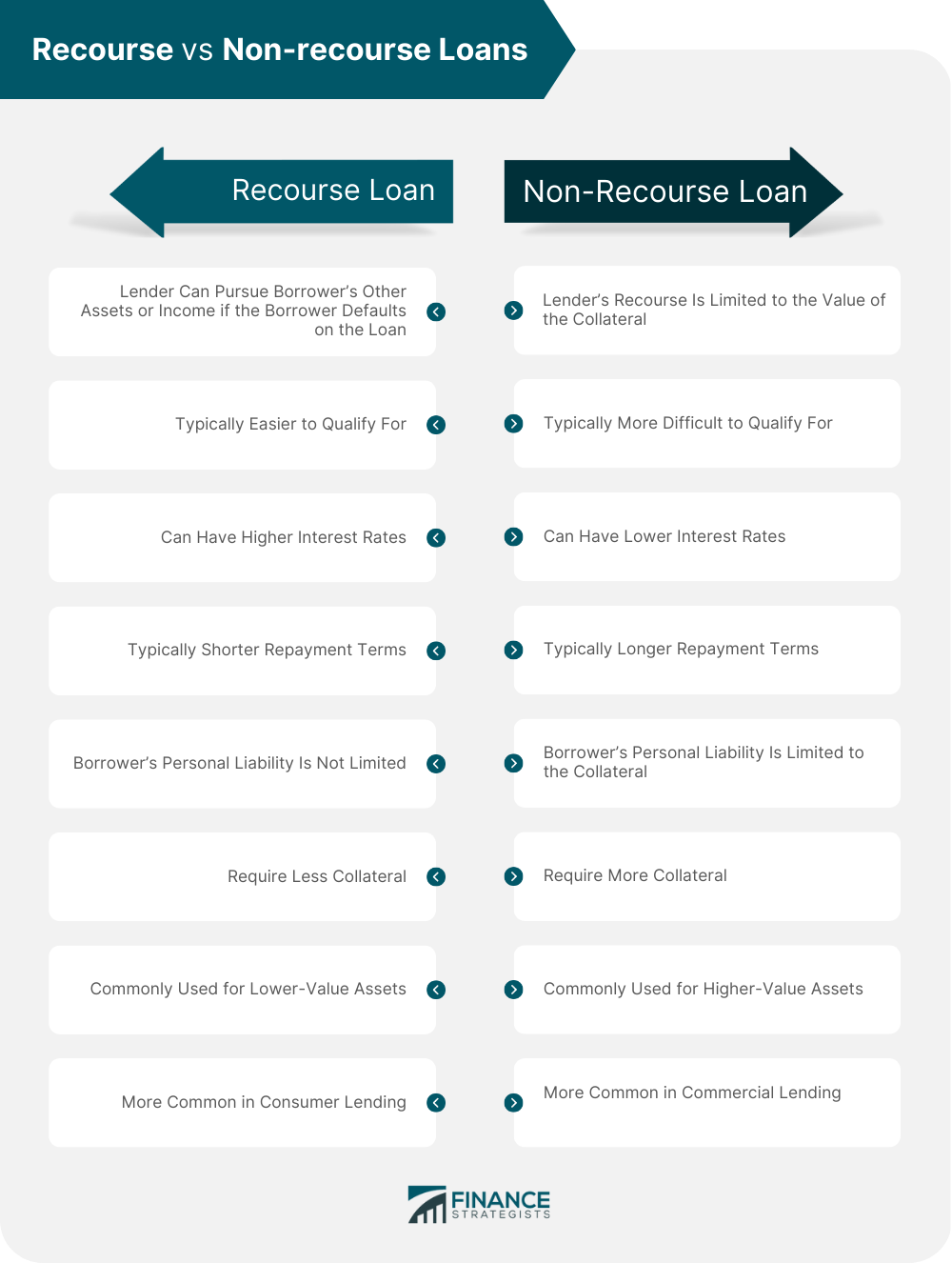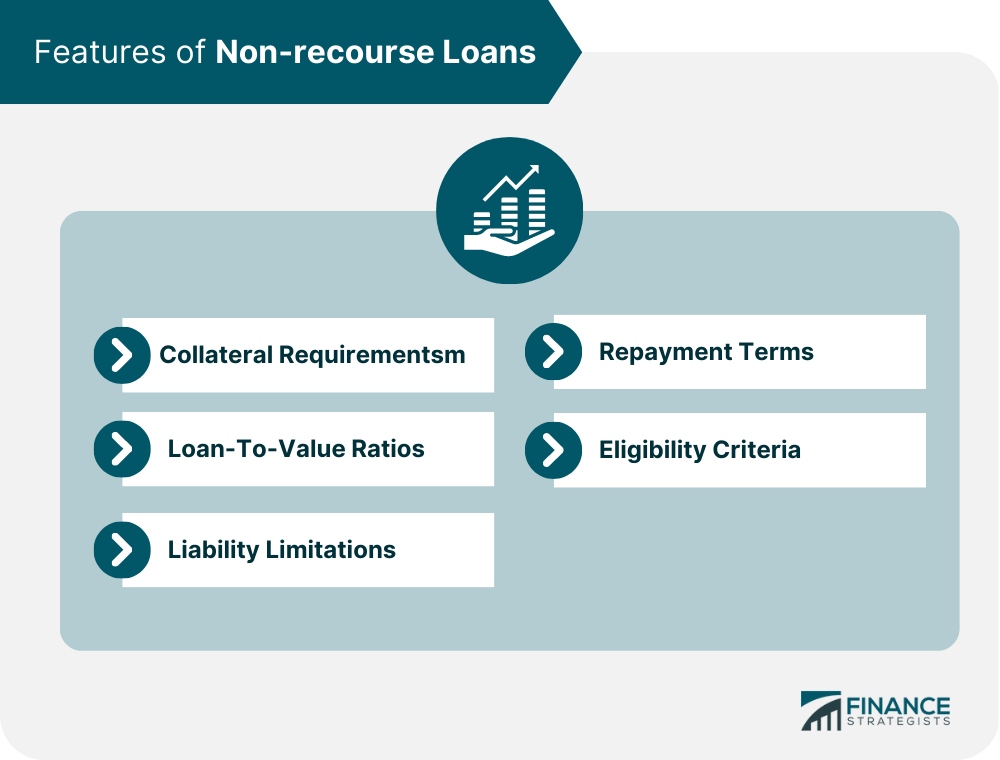A non-recourse loan is a form of loan that restricts the lender's recourse to the collateral's value, which can be real estate or equipment. In other words, if the borrower defaults on the loan, the lender can only collect the collateral and cannot go after the borrower's other assets or income. Non-recourse loans are often used for high-value assets, such as commercial real estate or large pieces of equipment, where the value of the collateral is expected to cover the loan amount. Have questions about non-recourse loans? Click here. Recourse and non-recourse loans are two types of loans that differ in their terms and conditions. Recourse loans are the opposite of non-recourse loans. In a recourse loan, the lender has recourse to the borrower's other assets or income if the borrower defaults on the loan. For example, if a borrower takes out a recourse loan to buy a car and then stops making payments, the lender can repossess the car and also go after the borrower's other assets, such as their savings account or wages. Non-recourse loans are often used for larger assets, such as commercial real estate or large pieces of equipment, where the value of the collateral is expected to cover the loan amount. In these cases, lenders may prefer to limit their recourse to the collateral rather than pursue legal action against the borrower. This is because the legal process can be time-consuming and expensive, and the outcome may not be in the lender's favor. The table below illustrates detailed differences between these two types of loans. Non-recourse loans have several key features that distinguish them from other types of loans. These features include collateral requirements, loan-to-value ratios, liability limitations, repayment terms, and eligibility criteria. One of the key features of non-recourse loans is the requirement for collateral. The value of the collateral must be sufficient to cover the loan amount, and the lender may require an independent appraisal to determine the value of the collateral. In addition, the lender may require the borrower to maintain insurance on the collateral to protect against loss or damage. Loan-to-value ratios (LTV) are another important feature of non-recourse loans. LTV is the ratio of the loan amount to the value of the collateral. Non-recourse lenders typically require lower LTV ratios than recourse lenders because the collateral is the lender's only recourse in the event of default. For example, a non-recourse lender may require an LTV ratio of 60%, meaning that the loan amount cannot exceed 60% of the value of the collateral. Liability limitations are a key feature of non-recourse loans. In a non-recourse loan, the lender's recourse is limited to the value of the collateral. This means that if the borrower defaults on the loan, the lender cannot go after the borrower's other assets or income. However, there are some exceptions to this rule, such as fraud or misrepresentation by the borrower. Repayment terms for non-recourse loans are similar to those of recourse loans. The borrower must typically make regular payments, including principal and interest until the loan is paid off. Non-recourse loans may have longer repayment terms than recourse loans because the collateral is expected to hold its value over time. However, longer repayment terms can also increase the risk of default, so lenders may require additional collateral or other safeguards. Non-recourse loans are typically offered to borrowers with a strong credit history, a high net worth, and a significant amount of collateral. Lenders may also require the borrower to have a certain level of experience in the industry or type of asset being financed. In addition, lenders may require the borrower to provide a personal guarantee, which would make the loan partially recourse in the event of default. Examples of non-recourse loans include commercial real estate loans, business loans, student loans, and car loans. Non-recourse loans are often used for commercial real estate projects, such as office buildings, shopping centers, and hotels. These loans are typically secured by the property being financed and are offered by commercial banks, private lenders, and Real Estate Investment Trusts (REITs). Non-recourse real estate loans can have lower interest rates and longer repayment terms than recourse loans, but they may also require a larger down payment and stricter eligibility criteria. Non-recourse loans are also available for businesses with significant assets, such as equipment or inventory, that can be used as collateral. These loans are often used for large capital expenditures, such as buying new equipment or expanding operations. They may be offered by commercial banks, private lenders, and alternative financing companies. The interest rates and repayment terms for non-recourse business loans can vary widely depending on the lender and the borrower's creditworthiness. Non-recourse loans are available for student loans, particularly for graduate and professional students. These loans are often offered by the federal government and do not require a credit check or a co-signer. They typically have fixed interest rates and flexible repayment terms, and they may be eligible for loan forgiveness programs. Non-recourse loans are also available for car loans, particularly for high-end or luxury vehicles. These loans are often offered by specialty lenders or car dealerships and require a significant down payment and strict eligibility criteria. They may have higher interest rates and shorter repayment terms than other types of non-recourse loans. Non-recourse loans come with certain risks for both borrowers and lenders. One of the main risks associated with non-recourse loans is that the borrower may lose their collateral if they default on the loan. This can be particularly risky for borrowers who have invested a significant amount of money in the collateral, such as a commercial real estate property or a piece of equipment. In addition, if the collateral loses value over time, the borrower may owe more on the loan than the collateral is worth. One of the main risks associated with non-recourse loans is that the collateral may not be sufficient to cover the loan amount in the event of default. This can be particularly risky for lenders who have a large portfolio of non-recourse loans or who are lending to borrowers in a high-risk industry or market. In addition, if the lender cannot recover the full value of the collateral, they may have to write off the remaining balance as a loss. Non-recourse loans are subject to specific legal requirements and limitations, which vary depending on the jurisdiction and the type of loan. They are governed by contract law, which means that the terms of the loan agreement will dictate the rights and obligations of the borrower and lender. In addition, non-recourse loans may be subject to specific statutes or regulations that govern lending practices, collateral requirements, and liability limitations. Liability limitations are a key aspect of non-recourse loans, and they can vary depending on the jurisdiction and the type of loan. In some cases, liability limitations may be subject to interpretation by the courts, particularly in cases where the borrower has engaged in fraud or misrepresentation. Non-recourse loans can be a valuable financing option for borrowers who have significant assets but want to limit their personal liability. These loans are often used for high-value assets, such as commercial real estate or large pieces of equipment, where the value of the collateral is expected to cover the loan amount. They have several key features, including collateral requirements, loan-to-value ratios, liability limitations, repayment terms, and eligibility criteria. Before taking out a non-recourse loan, borrowers should carefully consider their options and consult a mortgage broker to ensure that they understand the terms and risks of the loan.What Is a Non-recourse Loan?
Understanding Recourse vs Non-recourse Loans
Recourse Loans
Non-recourse Loans

Features of Non-recourse Loans

Collateral Requirements
Loan-To-Value Ratios
Liability Limitations
Repayment Terms
Eligibility Criteria
Examples of Non-recourse Loans
Real Estate Loans
Business Loans
Student Loans
Car Loans
Risks Associated With Non-recourse Loans
Potential Risks for Borrowers
Potential Risks for Lenders
Legal Implications of Non-recourse Loans
Final Thoughts
Non-recourse Loan FAQs
A non-recourse loan is a form of loan that is backed by collateral, often an asset like real estate or machinery. The value of the collateral is the maximum the lender may recover in the case of a default.
In a recourse loan, the lender can pursue the borrower's other assets or income if the borrower defaults on the loan. In a non-recourse loan, the lender's recourse is limited to the value of the collateral.
Non-recourse loans have several key features, including collateral requirements, loan-to-value ratios, liability limitations, repayment terms, and eligibility criteria.
Examples of non-recourse loans include commercial real estate loans, business loans, student loans, and car loans.
Risks associated with non-recourse loans include the potential loss of collateral for borrowers, the potential for insufficient collateral to cover the loan amount for lenders, the risk of collateral losing value over time, and the potential difficulty in recovering the full loan amount for lenders.
True Tamplin is a published author, public speaker, CEO of UpDigital, and founder of Finance Strategists.
True is a Certified Educator in Personal Finance (CEPF®), author of The Handy Financial Ratios Guide, a member of the Society for Advancing Business Editing and Writing, contributes to his financial education site, Finance Strategists, and has spoken to various financial communities such as the CFA Institute, as well as university students like his Alma mater, Biola University, where he received a bachelor of science in business and data analytics.
To learn more about True, visit his personal website or view his author profiles on Amazon, Nasdaq and Forbes.















